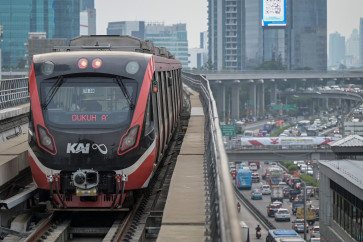Business tax promises lack substance
Confidence booster: President Joko “Jokowi” Widodo (center) and Vice President Jusuf Kalla (fourth right), pose with their wives and members of the House of Representatives and the Regional Representatives Council at the legislative complex in Jakarta on Tuesday, after delivering an annual state speech during the People’s Consultative Assembly annual session ahead of celebrations for Independence Day on Wednesday
Change text size
Gift Premium Articles
to Anyone

Confidence booster: President Joko “Jokowi” Widodo (center) and Vice President Jusuf Kalla (fourth right), pose with their wives and members of the House of Representatives and the Regional Representatives Council at the legislative complex in Jakarta on Tuesday, after delivering an annual state speech during the People’s Consultative Assembly annual session ahead of celebrations for Independence Day on Wednesday. Later in the day at the same venue, the President delivered another speech, detailing the government’s budget draft for next year. (JP/Wendra Ajistyatama)
The government says it plans to implement more accommodative tax policies for businesses next year but has failed to offer any breakthroughs.
In his annual state budget speech at the House of Representatives on Tuesday, President Joko “Jokowi” Widodo said the government would implement policies to improve the investment climate and industrial competitiveness through fiscal incentives for strategic economic activities and through a tax amnesty.
It expects tax policies to provide business incentives, in addition to becoming the main source of state income. Tax revenue is expected to contribute 75 percent of the targeted Rp 1.74 quadrillion (US$132.56 billion) in revenue.
Moreover, the government said in the budget statement that it would “dig into the tax potential at the national and regional level by optimizing extensiveness and monitoring functions”.
Those plans, however, offer little beyond measures already carried out in 2015 and 2016. Fiscal incentives were introduced through several economic policy packages rolled out in late 2015, while the tax amnesty officially commenced in June.

The government plans to revise the General Taxation System (KUP) Law and Income Tax Law as well, but those plans are not new either, since they have been around for quite some time but have yet to be implemented.
Finance Minister Sri Mulyani Indrawati told a press briefing on the same day that the ministry would find a way to balance the need to generate revenue with the need to boost economic activity. The minister, too, stopped short of providing details.
As the biggest economy in Southeast Asia, Indonesia continues to suffer from low tax revenue collection, with fewer than 30 million of the country’s approximately 240 million inhabitants registered as taxpayers.
As a result, the tax ratio is well below its potential. Data show that the tax ratio — revenue as a percentage of the gross domestic product (GDP) — remains low compared to neighboring countries.
Indonesia’s tax ratio reached a high of 13.9 percent in 2012 and is estimated to stand at just 12.9 percent this year. However, despite the latest promises on tax policy lacking detail, Indonesian Employers Association (Apindo) chairman Hariyadi B. Sukamdani said the government would likely manage taxation issues without jittering business.
He said the overall 2017 state budget seemed realistic at the moment.
“An unrealistic target will just make taxmen dig deeper into taxpayers [data], causing people to feel uncomfortable and put business expansions on hold,” said Hariyadi, who is also a member of the government-backed National Economic and Industry Committee (KEIN).
Bahana Securities senior associate director and head of strategy and research Harry Su wrote by text message that next year’s tax revenue target at 11 percent to 12 percent of GDP was realistic.
Meanwhile, Samuel Assets Management economist Lana Soelistianingsih and Center for Indonesia Taxation Analysis (CITA) executive director Yustinus Prastowo said the President’s recent statements about income tax and circulating news about the intention to establish onshore tax havens offered a glimpse of hope for tax breakthroughs.
However, both experts argued that the government had to proceed with caution. A reduction in the corporate income tax rate to 17 percent from the current 25 percent — in an attempt to compete with tax facilities offered in Singapore — may leave a hole in the tax revenue, said Lana.
“What if the government then decides to fill the hole by chasing after individual taxpayers? We will see a trade-off in household consumption, which has been the backbone of the economy.”
Yustinus, on the other hand, said the government had to carefully assess its tax haven plan to avoid facilitating money laundering.
“It can be a positive move if all the prerequisites are available, but it must not be a place to hide illicit funds.”
---------------
To receive comprehensive and earlier access to The Jakarta Post print edition, please subscribe to our epaper through iOS' iTunes, Android's Google Play, Blackberry World or Microsoft's Windows Store. Subscription includes free daily editions of The Nation, The Star Malaysia, the Philippine Daily Inquirer and Asia News.
For print subscription, please contact our call center at (+6221) 5360014 or subscription@thejakartapost.com









